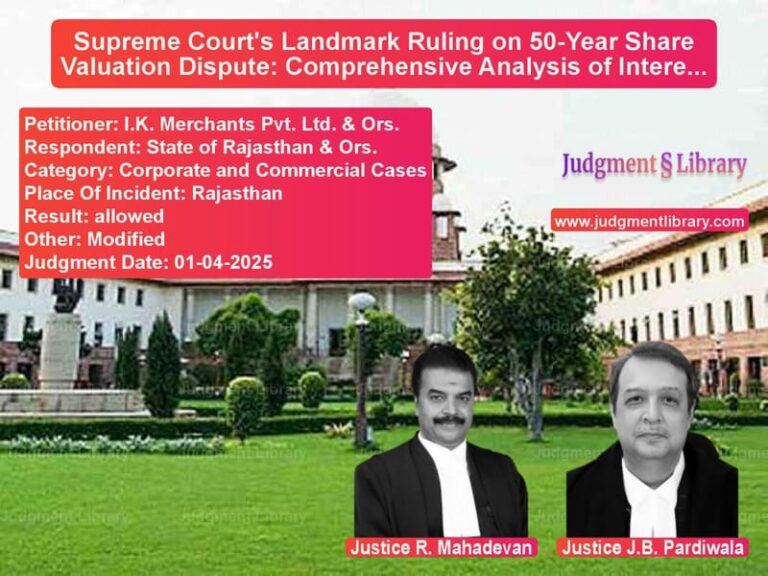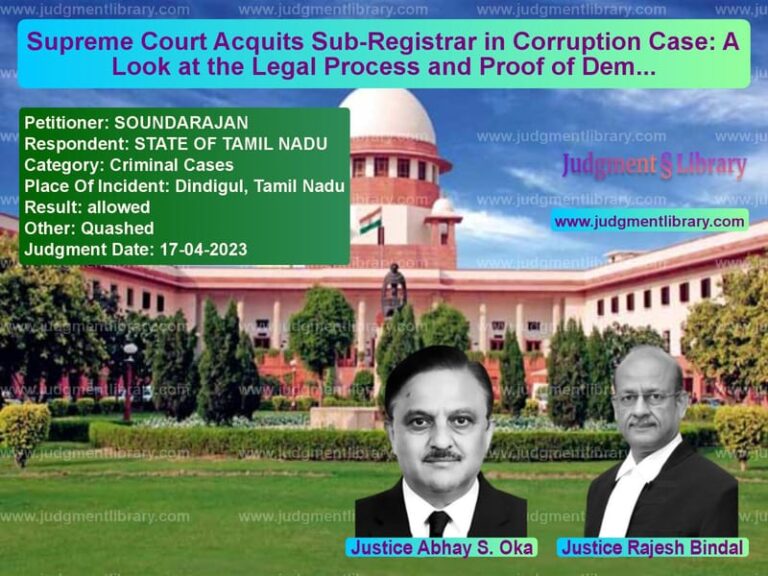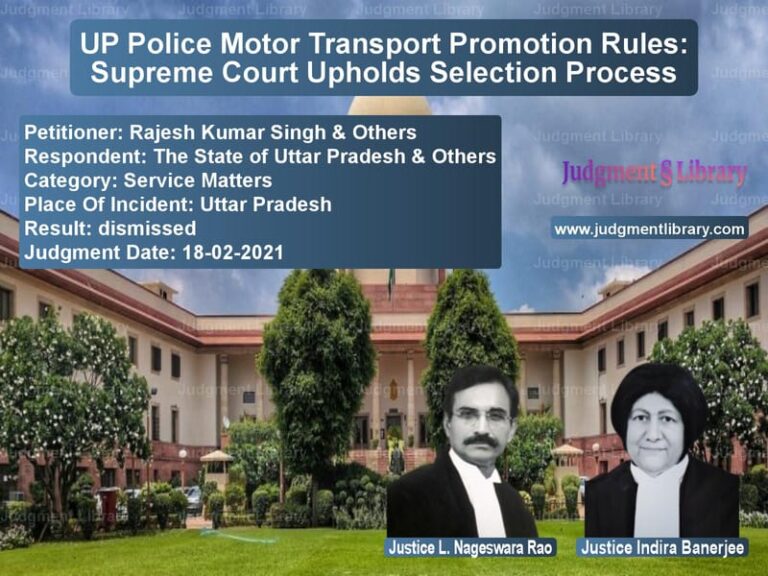Attempt to Murder Conviction Modified: Supreme Court Reduces Sentence in Assault Case
The case of Sivamani and Anr. vs. State Represented by Inspector of Police revolves around a dispute leading to an alleged attempt to murder. The Supreme Court, in this judgment, reconsidered whether the conviction under Section 307 of the Indian Penal Code (IPC) was appropriate or if a lesser charge was more fitting.
Background of the Case
The incident occurred due to a long-standing enmity between the complainant and the accused. The dispute stemmed from a property issue where a civil case was pending. The conflict escalated when the complainant, Prakash alias Chinnaraj (PW1), fenced off a portion of land, which led to a confrontation with the accused.
On September 15, 2012, the complainant was at his grocery shop when the accused, along with three others, arrived. Accused No.1 allegedly instigated the others, following which the appellants (Accused Nos.3 and 4) attempted to attack the complainant with knives. However, the complainant managed to escape with only minor injuries. The complainant’s mother (PW2) was also allegedly assaulted.
Read also: https://judgmentlibrary.com/supreme-court-quashes-criminal-case-against-husband-in-dowry-dispute/
The police registered a case under Sections 294(b), 323, 324, 452, and 307 read with 109 IPC. After trial, the Trial Court acquitted three accused but convicted the appellants under Section 307 IPC (Attempt to Murder), sentencing them to 10 years rigorous imprisonment and a fine of Rs. 1000 each. On appeal, the High Court reduced the sentence to 5 years rigorous imprisonment, maintaining the conviction under Section 307 IPC.
Petitioner’s Arguments
The appellants, Sivamani and Dinesh Kumar, contended:
- The injuries sustained by the complainant and his mother were minor and non-life-threatening, which does not justify a conviction under Section 307 IPC.
- There was no premeditation or sustained attack that indicated an intent to kill.
- The incident was a result of an ongoing property dispute, and there was no conclusive evidence proving an attempt to murder.
- The medical report indicated only simple injuries, which should have led to charges under Sections 323 (voluntarily causing hurt) and 324 (voluntarily causing hurt by dangerous weapons) rather than Section 307.
Respondent’s Arguments
The State, represented by the police, countered:
- The accused were armed with knives, which indicates intent to cause serious harm or death.
- The attack could have been fatal if the complainant had not managed to escape.
- The presence of multiple accused indicated a pre-planned assault aimed at eliminating the complainant.
Key Legal Issues Considered
1. Whether the Conviction Under Section 307 IPC Was Justified
The Supreme Court examined whether the evidence supported an attempt to murder or if the injuries indicated a lesser offense.
2. Interpretation of Section 307 IPC
The Court analyzed previous rulings where the intent to kill and severity of injuries played a crucial role in determining charges under Section 307 IPC.
3. Severity of Injuries as a Determining Factor
The Court considered whether minor injuries could justify a conviction for attempted murder.
Supreme Court’s Verdict
The Supreme Court modified the conviction, making the following observations:
- There was no evidence of multiple or severe blows inflicted by the accused.
- The injuries on the complainant and his mother were found to be simple in nature and not life-threatening.
- For a conviction under Section 307 IPC, the attack must be capable of causing death. The medical evidence did not support this conclusion.
- Instead of Section 307 IPC, the facts of the case warranted charges under Sections 323 and 324 IPC, which deal with causing hurt.
- The Court reduced the sentence to the period already undergone, maintaining the fine but discharging the appellants from further imprisonment.
Key Takeaways from the Judgment
- Injuries Matter: The severity of injuries is a key factor in determining whether an act qualifies as an attempt to murder.
- Intent vs. Circumstances: Simply carrying a weapon does not prove intent to kill; surrounding circumstances must be examined.
- Judicial Review of Sentencing: The Supreme Court ensures that punishment aligns with the crime’s actual severity.
- Alternative Charges: The Court can modify convictions if a lesser offense is more appropriate under the circumstances.
This ruling reinforces the importance of correctly applying legal provisions based on evidence and prevents excessive sentencing where intent to murder is not conclusively proven.
Petitioner Name: Sivamani and Dinesh Kumar.Respondent Name: State Represented by Inspector of Police, Vellore Taluk.Judgment By: Justice Vikram Nath, Justice Ahsanuddin Amanullah.Place Of Incident: Vellore, Tamil Nadu.Judgment Date: 28-11-2023.
Don’t miss out on the full details! Download the complete judgment in PDF format below and gain valuable insights instantly!
Download Judgment: sivamani-and-dinesh-vs-state-represented-by-supreme-court-of-india-judgment-dated-28-11-2023.pdf
Directly Download Judgment: Directly download this Judgment
See all petitions in Attempt to Murder Cases
See all petitions in Judgment by Vikram Nath
See all petitions in Judgment by Ahsanuddin Amanullah
See all petitions in partially allowed
See all petitions in Modified
See all petitions in supreme court of India judgments November 2023
See all petitions in 2023 judgments
See all posts in Criminal Cases Category
See all allowed petitions in Criminal Cases Category
See all Dismissed petitions in Criminal Cases Category
See all partially allowed petitions in Criminal Cases Category







